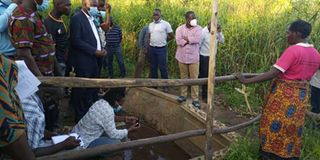Prime
Report warns of looming water scarcity in Albertine

The then minister for Economic Monitoring in the Office of the President, Mr Peter Ogwang (in jacket), at a water source in Bunyoro Sub-region in 2021. PHOTO/ FILE
What you need to know:
The report says a rapidly growing population and industrial activities have led to significant strain on water sources.
The Albertine Sub-region faces severe water shortage over industrialisation and environmental degradation, a new study shows.
According to a report conducted this year by Zutari, a firm contracted by the Ministry of Water and Environment, a rapidly growing population and expanding human and industrial activities have led to significant strain on both underground and surface water sources.
The report predicts that by 2040, certain sub-zones in the sub-region will have deficits in both ground and surface water. Prominent water bodies in the area such as Lake Albert, Lake George, Lake Edward, River Kafu, River Semliki, and Victoria Nile, are under severe threat, according to the report.
According to the report, the districts most affected by reduced surface water availability are in Albert and Edward sub-zones. For instance, Bundibugyo, Ntoroko, Kagadi, and Kikuube in the Albert sub-zone have only 1.76 cubic metres per second. Dr Seith Mugume from Zutari points out that the escalating water demand for various purposes, including domestic, industrial and irrigation, has led to a current aggregate water demand of 749,837 cubic metres per day in the region, where the population is estimated to be 14.6 million.
This aggregate demand is projected to surge to 6.755 million cubic metres per day by 2040 due to population growth and other factors.
Dr Mugume says the emergence of oil activities has further intensified the demand for groundwater, saying during peak, the aggregate water demand is 43,000 cubic metres per day.
“In the areas where oil activities are taking place, water should be abstracted from Lake Albert not from underground because by the time oil drilling activities are done, the groundwater will be no more,” he said on Tuesday.
According to the report, this heightened demand, coupled with environmental degradation, is expected to lead to water balance deficits.
High-risk districts such as Kyenjojo, Kyegegwa, Kibaale, and Kagadi may experience water balance deficits of -1.7 cubic metres per second during the dry season from June to August by 2040.
The report also highlights significant challenges such as wetland reclamation, deforestation, and soil erosion in the region.
To combat these issues, the Ministry of Water and Environment, through the Albert Water Management Zone, which oversees water resources across the 55 districts in the region, has formulated a plan to conserve and protect threatened water bodies.
Dr Emmanuel Brian Guma, the leader of the Albertine Water Management Zone, said the catchment remedial measures, including soil and water conservation, river bank demarcation, and catchment water retention.
“True there is the uncertainty of water insecurity by 2040 in the Albertine but we can reverse that if we implement the developed catchment remedial measures developed by the Ministry of Water and Environment,” he said.
Local leaders speak
Local leaders and environmentalists have urged the government to take immediate action to reverse the trend and ensure the security of both surface and groundwater resources. Mr Richard Rwabuhinga, the chairperson of Kabarole District, stressed the need for a collaborative effort across sectors to restore and conserve water resources in the region.




